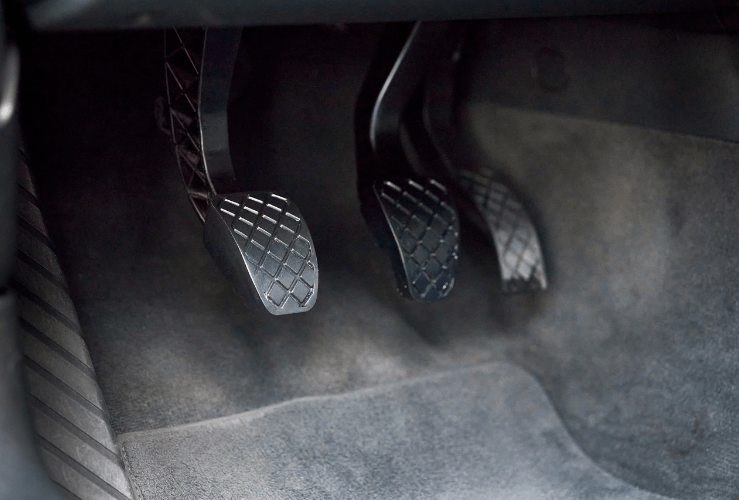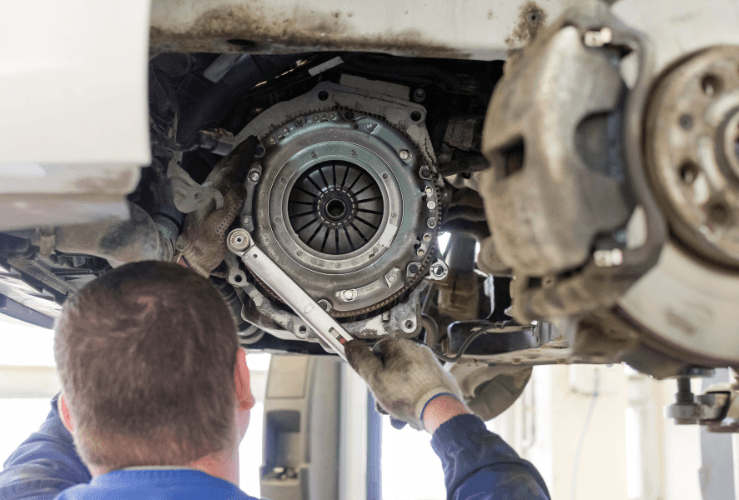A fully functional clutch is essential for the safe and effective operation of your car. If you experience any of the following symptoms, you may need a new one.
The clutch is a key component of any manual shift car. It connects and disconnects power from your engine to your wheels, by way of the gearbox. This allows the car to speed up and slow down without disengaging the engine. It also works to get your vehicle moving in the first instance, working in unison with your transmission.
Clearly, a fully functional clutch is essential for the smooth and effective operation of your vehicle. But what are the signs your clutch has failed - or is about to fail?
Here we explore the common signs a clutch has developed an issue and needs repair or replacement. It's important to be able to accurately diagnose a clutch fault without accessing the clutch itself, since repair work can be costly and time consuming. An experienced mechanic should be able to make a diagnosis without accessing the clutch.
In most cases, a faulty clutch must be replaced - although clutch misalignment, when spotted early, can be fixed without needing a new one.

Engine speed rises but speed does not
A common sign your clutch may be faulty is when you depress the accelerator but your road speed does not rise as expected - even though your engine speed (RPM) does.
This can become apparent when attempting to overtake a vehicle and not being able to do so as quickly as required.
It is likely to be an issue when using 4th or 5th gear.
Nothing happens when you're in gear and release clutch
The most obvious sign your clutch needs to be repaired is when you put your vehicle into gear and release the clutch, but nothing happens.
Rigid accelerator pedal
Another sign your clutch is worn or faulty is a rigid clutch pedal. Normally there should be some 'give' in the pedal as you depress it, but a bad clutch can make the pedal feel rigid when you use it.
Additionally, if your clutch pedal does not return to its start position as normal, your clutch may have an issue.
Won't go into gear
If your car won't go into gear with the clutch down, you may well have a clutch problem.
Difficulty changing gear
If changing gear is not smooth, or involves some grinding, there could be a problem with your clutch.
Grinding suggests the clutch disc is remaining engaged when it shouldn't be.
Squealing or rumbling sound when clutch is depressed
This can be caused by a worn throwout bearing.
Striking, vibrating, or spongy clutch pedal when depressed
This can be caused by a flywheel or pressure plate issue, among others.
Clutch remains near the floor when released
This means there are binding issues with the release bearing or linkage.
Clutch slips, resulting in momentary acceleration loss
This can be caused by worn-out clutch friction material.
Without the requisite friction, your clutch won't engage as it should.
In some cases, an aggressive driving style may cause the clutch to slip, so stopping this may help.

Reasons a clutch fails
Common causes of a faulty clutch include:
- Leaking master or slave cylinder. This can happen with hydraulic clutches - the most common type on modern cars. Without sufficient hydraulic pressure, the clutch will not work as required.
- Worn or poorly lubricated throwout bearing. This can result in a squealing noise.
- Worn clutch disc - an issue more likely if the vehicle has been driven hard or recklessly. The vehicle may struggle to accelerate under a heavy load.
- Warped flywheel - caused by prolonged overheating. This can cause clutch vibrations.
- Worn-out pressure plate - this can wear out easily, since it is one of the hardest-working parts of your clutch. This can also cause clutch vibrations.
Signs a car may develop clutch issues prematurely
When buying a second-hand vehicle, there are signs to look out for that might suggest the clutch has been pushed harder than normal.
Towing things like trailers and caravans can wear out a clutch sooner than it otherwise would. Regular reversing also places a heavy toll on clutches.
When considering buying a used car, ask if it has been used to tow often.
How to prolong the life of your clutch
There are steps you can take to reduce the chances of needing a new clutch.
- Avoid 'riding' your clutch, which can burn it out sooner. Instead, keep your foot off the clutch whenever you are using the accelerator; only use your clutch when required. You should also avoid holding your clutch at the biting point for too long.
- Top up your clutch reservoir regularly (every 20,000 miles or every 2 years). Without enough fluid, you won't be able to change gears as quickly as needed.
- Use the handbrake during hill starts; using your clutch alone to keep in place can result in excessive wear.
- Listen for unusual noises (as mentioned above) and get them checked out by a professional.
- Avoid driving with excessive weight, and know that towing can put extra pressure on your clutch.
- When stopped at traffic lights, sit in neutral with the handbrake on; remaining in first gear with the brakes applied can place extra strain on clutch components.
- Change gear swiftly and smoothly - but carefully.





